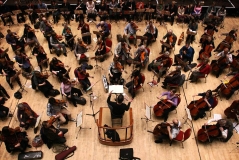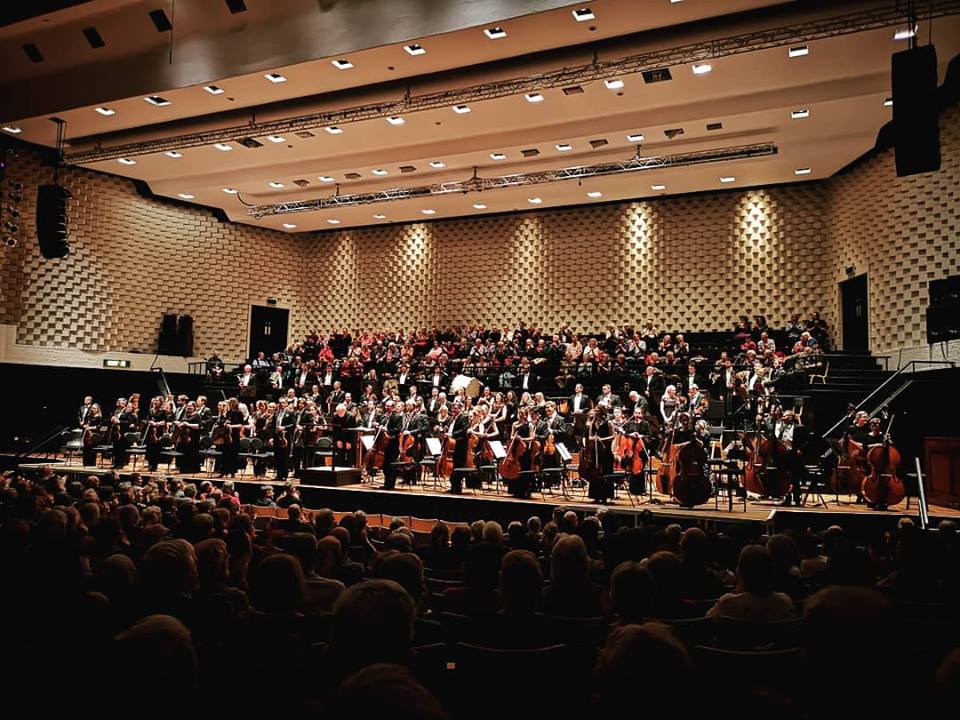The Music of Williams & Zimmer @ The Forum

Posted on: 2019-03-29
Our rating:
Bournemouth Symphony Orchestra brought together some of the composers best scores in this five star film concert. Jamie Caddick reviews:
It was originally advertised as Williams Vs Zimmer, then changed to The Music of Williams & Zimmer. And, as affable conductor Pete Harrison quite rightly pointed out at the start of the concert, this wasn't so much a battle of two of the most gargantuan forces in the history of contemporary film music, rather a celebration of their supreme talents and the influence they've had on generations of movie and music fans. The tingling sense of anticipation and excitement in the air was palpable and the audience and Bournemouth Symphony Orchestra were more than ready.

If truth be told, pitting Williams against Zimmer is a bit like sparring King Kong against Godzilla, so powerful and colossal are their imposing stature and impact. For one thing, Zimmer's style is polar opposite to Williams'; Zimmer favouring a more minimalistic, stripped back approach compared to William's more varied orchestral dynamism and frequent fanfaric flourishes. Both are, nevertheless, masters of their craft, so it was a tantalizing prospect indeed to see (or rather hear) how a programme dedicated entirely to the music of the two colossal maestros would stand up.
It stood up very, very well. Fairly divided to alternate equally between the two composers, Williams' epic Superman march was a brilliant, adrenaline-pumping, heroic curtain-raiser. Zimmer's Madagascar began with a John Barry influence before shifting to something more jaunty and playful. Lincoln demonstrated Williams' in true Aaron Copland Americana mode, full of yearning, elegiac strings and beautiful, noble trumpet solos; while Interstellar is easily one the best scores Zimmer has composed in recent years, conjuring a stunningly hypnotic, organ-heavy immersive soundscape.
Peppered throughout the evening were, refreshingly, a few lesser-known and performed Williams' works, one of which was the plaintive, delicate Angela's Ashes, whose tender piano main theme segued into a heavier wash of emotive, plangent strings; and even if, as a movie, The Da Vinci Code was a rare Tom Hanks stinker, Zimmer's 'stained glass cathedral' music was a magnificent, powerful orchestral triumph.
Few pieces can silence an audience to the extent you could hear a pin drop, but WIlliams' haunting, heart-rending theme from Schindler's List does it every time, led by a sublime performance by lead violinist Ruth Rogers. Zimmer's Gladiator was a tightly constructed suite that presented some of the film's key scenes, from the evocative and poignant sadness of the main character to the thrilling, no-holds-barred, full-on bombast of battle; a towering musical testament to Russell Crowe's Maximus Decimus Meridius indeed.
Following a 20-minute interval (legs stretched, bladder emptied, Marshfield ice-cream consumed), the audience re-seated and the orchestra re-grouped to open the second half with Williams' immortal, classic March from Raiders of the Lost Ark, evoking the derring-do, whip-cracking adventures of Harrison Ford's Indiana Jones, then sidekick Marion's lush, romantic theme before the titanic might of the brass section brought things to a rousing finale.
One of Zimmer's earlier scores, Driving Miss Daisy is a delightful cracker, its main theme immediately catchy and hummable, pausing for a brief, touching interlude before cranking it up to finish on an upbeat, jazzy high; his passionate love theme from Pearl Harbour was given an intense rendition, before Williams' relatively simple yet elegantly effective Sayuri's Theme from Memoirs of a Geisha showed the composer's more understated side.
A suite from Zimmer's The Last Samurai demonstrated his skillful fusion of Eastern and Western musical influences. The last 20 minutes, however, was perhaps the highlight of the evening. It saw a suite of Williams' music specially arranged for the Bournemouth Symphony Orchestra by Classic FM for their 25th birthday; Hedwig's Theme from Harry Potter elicited excited gasps and giggles from the audience's younger members; Jurassic Park's heroic Journey To The Island gave the brass section a proper, meaty workout; the strings soared magnificently to ET's sweeping Flying Theme; and Throne Room and End Titles from Star Wars was an absolute belter, fusing some of the film's key thematic motifs and rounding the whole medley off as an satisfying, utterly crowd-pleasing whole.
The amassed throng well and truly psyched, blistering applause and hollering guaranteed Harrison would pick up the baton one last time for an encore - but not before he put the clap-and-cheer-ometer to the test to see if the audience hailed Williams or Zimmer as the night's crowning, reigning film music victor. Williams won (unsurprisingly), so as commiseration to Zimmer he led the orchestra into an absolutely stunning tour de force of music from Pirates of the Caribbean, packed with the now-familiar sea shanty tune amongst others and showcasing some of the most incredible, thashing, deafeningly brutal drumming I've ever heard in a symphony orchestra. A swashbuckingly impressive finish, no question.
I've been to a multitude of these film music concerts and I defy anyone to say that any other group of musicians nail it quite like Bournemouth Symphony Orchestra and conductor Pete Harrison. The playing is impeccable and Harrison has a real gift for coaxing the finer details and nuances of the pieces from the orchestra; in fact, the film music renditions are usually so spot-on in terms of dynamics and phrasing and tempo, you'd be hard-pressed to differentiate their interpretations from the original recordings. Harrison is also an extremely likable chap; garrulous and genial, his intros into the music are insightful and entertaining and it's clear he has a real passion and enthusiasm for film music. It is infectious.
An orchestra at the top of its game, this was a masterclass in how to put on an outstanding, faultless film music concert of two of cinema's most influential and revered contemporary composers. Pure movie music magic from start to finish.
Article by:

Jamie is a writer, blogger, journalist, critic, film fan, soundtrack nerd and all-round Bristolian good egg. He loves the music of Philip Glass, the art of Salvador Dali, the writings of Charles Bukowksi and Hunter S Thompson, the irreverence of Harry Hill, and the timeless, straw-chomping exuberance of The Wurzels. You can sometimes find him railing against a surging tide of passing cyclists, or gorging himself senseless on the Oriental delights of a Cosmos all-you-can-eat buffet.

